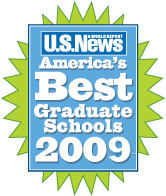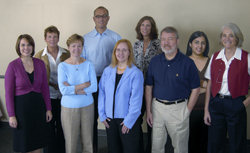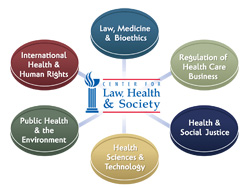Center for Law, Health & Society | News and Events | Center News | 2008 Archive | 5-year-old health law program ranked among top in nation 5-year-old health law program ranked among top in nation
October 14, 2008
Center works with law to promote society's health
It began with an introductory course for third-year law students. Charity Scott, newly hired in 1987 as an assistant professor, now jokes about her first survey course in health law.
"I tried to cover the entire law school curriculum in 10 weeks, since that what health law is--all laws affecting health," she laughs. "I went from A to Z--Antitrust, Administrative law, Bioethics, Corporate law, Discrimination and so on down the alphabet to explore how these laws impacted our health care system. Admittedly, it was a bit much."
Over 20 years later, Scott has captured the breadth of the health law field in the Center for Law, Health & Society, which she directs and which oversees the health law program at the College of Law. Today, students can enroll in an array of courses that examine the role of law in society's health. The Center has become a hub of health-law activity, attracting faculty from across the nation and holding conferences on cutting-edge issues like stem cell research and conscientious objection in health care.
Top 10 ranking
The health-law program has been ranked No. 10 in the nation two years in a row - in 2007 and 2008 - by U.S. News & World Report. Scott gives credit for this success to the high quality of new faculty, professional staff, and students in the program.
The Center also benefits from the law school's location in Atlanta, which is at the crossroads of regional and national government health agencies, leading universities, and a rapidly developing business community in the non-profit and for-profit sectors of health care and biotechnology. The Center has built partnerships with many of these institutions across Atlanta, which has fostered its reputation locally as well.
The faculty grows
Building on partnerships within Georgia State University, the College of Law has secured new faculty lines to attract national scholars with expertise across the health law field. For example, two new faculty positions are affiliated with the Partnership for Urban Health Research in the College of Health and Human Sciences.
"The health law field is really exploding, but few universities have supported it as well as Georgia State has," said Professor Paul Lombardo, who left the University of Virginia after 16 years to join the College of Law in 2006. Lombardo teaches courses on genetics and the law, mental health law, and the history of bioethics, among other topics. "I'm very pleased to be at a university that is giving this field priority."
Leslie Wolf taught courses on medical ethics and medical research at the University of California, San Francisco medical school before joining the College of Law in 2007 as an Associate Professor. She now teaches public health law, HIV/AIDS and the law, and human subjects research law and ethics.
 Professor Wolf was drawn to Georgia State because of the connections that the Center had already established in the health community. "I was able to find a very good fit with my interests," she said. Wolf was recently appointed to serve on the Ethics Committee to the Advisory Council at the Centers for Disease Control and Prevention (CDC).
Professor Wolf was drawn to Georgia State because of the connections that the Center had already established in the health community. "I was able to find a very good fit with my interests," she said. Wolf was recently appointed to serve on the Ethics Committee to the Advisory Council at the Centers for Disease Control and Prevention (CDC).
Jonathan Todres, a children's law and human rights expert, came to Georgia State as an Associate Professor at the same time as Wolf. He has written extensively about the U.N. Convention on the Rights of the Child and its implementation, and teaches courses on public health law, international health law, and children's rights.
"There's now a critical mass in terms of faculty," said Todres. "And what's really wonderful is that we all share common interests yet also cover different areas of health law, which offers our students a range of opportunities to engage in the field."
Center-affiliated faculty also include talented adjuncts from government agencies and the local practicing bar. The Center's first Faculty Fellow was Gene Matthews, who had served for 25 years as chief legal counsel to the CDC. One of the current Faculty Fellows is Roberta Berry, an Associate Professor of public policy and Director of the law, science, and technology program at the Georgia Institute of Technology. Her teaching and research focuses on biotechnology and bioethics.
Interdisciplinary mission
 "We're trying to change the traditional image of doctors and lawyers as adversaries," Scott observes. "We're allies and partners with health professionals."
"We're trying to change the traditional image of doctors and lawyers as adversaries," Scott observes. "We're allies and partners with health professionals."
The Center reaches out to all health-related disciplines -for example, medicine, nursing, social work, public health, health administration, and health policy - to see how they can work together with lawyers to understand the role that law should play in promoting society's health.
The Center's interdisciplinary mission is reflected in its educational curriculum, research initiatives, community outreach, and conferences and public programs. Many of the nearly 20 health law courses now can be taken by graduate students in other disciplines across campus. Berry's course on biotechnology law enrolls law students and graduate science and engineering students from Georgia Tech.
Research grants also extend across disciplines. Lombardo and Wolf have joined with public health faculty from Emory University on a NIH-funded grant to study emergency preparedness. Scott and Sylvia Caley, a clinical faculty member at the law school, were recently awarded a grant from the Georgia Department of Community Health and will work with faculty from the Institute of Health Administration in the Robinson College of Business to study health disparities among racial and ethnic minorities.
Health Law Partnership
 One ambitious project to unite the work of hospital professionals and lawyers is the Health Law Partnership (HeLP), an innovative community collaboration among the Center, Children's Healthcare of Atlanta, and the Atlanta Legal Aid Society. HeLP serves low-income families whose children are patients at one of Children's th
One ambitious project to unite the work of hospital professionals and lawyers is the Health Law Partnership (HeLP), an innovative community collaboration among the Center, Children's Healthcare of Atlanta, and the Atlanta Legal Aid Society. HeLP serves low-income families whose children are patients at one of Children's th
ree hospitals in Atlanta.
"Often sick children need more than health care to get them well," said Caley, who is HeLP's overall Director. "We're there to address the social and economic problems that poor families face which threaten their children's health." HeLP serves families at Children's whose income is less than 200% of the federal poverty line, and has legal services offices on all three Children's hospital campuses.
HeLP's attorneys can help clients with family law issues (like legal guardianship for a child's caregiver to give medical consent, or legitimation of paternity to secure child support); housing problems (such as unsanitary conditions that can worsen a child's asthma); domestic violence (to ensure safety for children); and employment and public benefits (to provide income security for a family and health insurance to secure access to health care).
Another Center-affiliated Fellow, Aisha Saeed, is a graduate of the College of Law ('07) and has received an Equal Justice Works Fellowship to work with HeLP on special education issues. Her fellowship is supported by the law school and Ford & Harrison LLP in Atlanta.
Hands-on education
HeLP's educational component is supported by the HeLP Legal Services Clinic, which is an in-house clinic at the law school that offers students the opportunity to take client cases referred by HeLP. Lisa Bliss is a clinical faculty member with the clinic, and she and Caley are co-Associate Directors overseeing the clinic's operations.
"We're giving students a hands-on education in how to be a lawyer," said Bliss. "This experience may be the first time students have ever served clients, and we provide a supportive learning environment for them to develop their lawyering skills."
Bliss is also teaching a new course on public interest law and social welfare, whose topics overlap with many of the issues raised in HeLP clients' cases. She and Caley are working on a law manual for students and pro bono attorneys with HeLP to guide them through the thicket of legal regulations in the poverty law field.
Randall Hughes is another Faculty Fellow with the Center, who for many years was head of the health care law department of Powell Goldstein LLP in Atlanta. In addition to teaching a course on the regulation of the health care industry, he participates in both HeLP and the clinic. He says law students often bring useful skills learned outside the clinic into the classroom.
"It's amazing how many students have diverse backgrounds that contribute to the overall success of the program," said Hughes. "Their commitment to doing good is extraordinary."
Health Legislation & Advocacy is another lawyering skills course. It allows students to work directly with non-profit community partners to help with researching and drafting proposed legislation for introduction in the Georgia legislature. One such bill, which was passed earlier this year and signed into law, was intended to clear the way for corporations to work with state agencies to assist in relief efforts during emergencies.
Lee Gillis, who worked on the legislation as a student in 2006 and saw it fizzle in the 2007 session only to be picked back up in 2008, said the measure limits a company's liability when providing relief on behalf of the state.
"If you have a group of in-house lawyers, and their clients don't have this protection, they're more likely to advise them to sit on their hands," said Gillis, who now practices in Macon with the firm James, Bates, Pope and Spivey. "The bill was designed to help corporations be Good Samaritans without making their legal counsel nervous."
Furthering discussion
Aside from teaching, research and public service, the faculty and professional staff of the Center also take seriously their role of adding to public discourse on legal issues inherent in all aspects of health. Since its inception the Center has hosted many conferences, roundtables, and other discussions on how the law impacts the well-being of individuals, families, and communities.
Nationally prominent scholars and practitioners from a variety of legal and health-related disciplines have come to the law school to discuss such issues as genetics and eugenics, public health and the law, biotechnology law and ethics, stem cell research and policy, and alternative dispute resolution in health care settings.
In 2007, the Georgia General Assembly passed legislation making way for a new state advance directive form, which helps families and medical professionals deal with end-of-life decisions. The effort began the previous year when, at the request of alumnus state Rep. Steve "Thunder" Tumlin (R-Marietta), the Center worked with law Professor Mary Radford to convene an interdisciplinary working group of stakeholders from across Georgia to help streamline the complicated form and rewrite its associated legislation.
"The Center served as a nonpartisan forum to gather a variety of perspectives on the issue and work together toward consensus," said Jerri Nims Rooker, the Center's Associate Director, who coordinated the months-long effort.
Nims Rooker, a Georgia State law graduate herself ('03), also oversees the Center's involvement with students and alumni. The Graduate Health Law Network (GHLN) is undertaking a development campaign this year to support the Center's work, which is spear-headed by law school graduates David Johnson ('89) and James Westbury ('94). Working with GHLN, the Center offers a mentor program that pairs current law students and law school alumni who share interests in the health law field.
The Center also sponsors a program for law students to mentor high school students in health sciences from the New Schools at Carver, part of the Atlanta public schools system in downtown Atlanta. "This is just one more way that the Center bridges the law school with its community," said Nims Rooker, "and collaborates with partners from across the many disciplines that promote society's health."